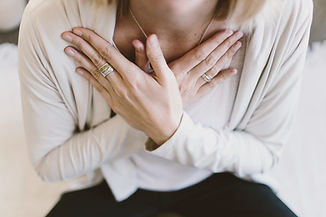What is Depression?
- Imelda Sisneros

- Dec 14, 2021
- 4 min read

It might seem like a fairly straightforward question, but do you know what depression is? We hear the word a lot, and it is pretty common for people to say they feel a ‘bit depressed’ or that a situation or experience is ‘depressing.’ However, true depression is much more than a feeling of sadness, frustration, or low mood; it is a medical condition that sometimes requires medical attention. However, the idea of being diagnosed with a mental health condition can be frightening for many people; nobody wants to feel defined by a diagnosis. With a better understanding of what depression is - and what it isn’t - we can move past the stigma and see that acknowledging depression as a normal experience can be the first step on the healing journey.
What is Depression - A Scary Word?

Sometimes people suspect they are experiencing a depressive illness, but they feel afraid of labeling themselves depressed. We are sometimes afraid to put a name on how we feel because it seems somehow more ‘real’ when we do. It can feel a bit easier and more comfortable to say that we are feeling down, having a hard time, or to blame external circumstances or other people for how we are feeling. Don’t be afraid of the word depression. It doesn’t mean that your feelings are not going to change. It is not a life sentence. And even more importantly, it doesn’t mean you have to ‘do’ anything specific until you are ready and willing to talk to someone. Try to see a diagnosis of depression as a good thing. It explains how you are feeling! It justifies all those confusing symptoms! It means you are NOT going mad. You are suffering from a common condition that affects many, many people. It is treatable!
How is Depression Diagnosed?

Every case is different, so it is important to talk to a doctor or other health professional if you are feeling low. However, there are some common symptoms (both physical and mental/emotional) that often occur in those experiencing a depressive episode.
Mental, Emotional, and Physical Symptoms
Low mood - feeling sad, down, or upset.
Irritability - getting irritated easily over small things.
Anxiety - excessive worrying, feeling fearful.
Anger - feeling angry or having difficulty managing angry feelings.
Restlessness - feeling unsettled, not knowing what to do.
Loss of interest in things such as activities, hobbies, work, sex, etc.
Intrusive thoughts - fixating on specific thoughts, finding it hard to let go of the past.
Thoughts of self-harm, death, or suicide.
Tiredness, fatigue, lethargy.
Sleep disturbances - insomnia, oversleeping or waking in the night.
Aches and pains unexplained by illness or injury.
Changes in weight - loss or gain.
Appetite changes - reduced or increased eating.
Cognitive impairment - ‘brain fog,’ trouble making decisions, forgetfulness.
As you can see - it’s a very long list. Experiencing just a few of these symptoms over a period of more than a few weeks may be considered by your doctor to be a depressive episode. We need to understand that it is different for every person. One sufferer might experience almost all of the above symptoms and feel like no aspect of their mental, emotional or physical life is untouched. Another sufferer might only experience low mood and some trouble getting to sleep. Depressive episodes can be mild and relatively manageable, and they can be severe and debilitating. One person may suffer for a short time, while another suffers for a longer time. So you see, there is no one answer to the question, ‘what is depression?’
Depression Risk Factors

The risk factors are varied; genetics play a part, as does brain chemistry, other medical conditions, and medications. Past trauma and life experiences have a big impact on our lives, and people are more prone to depressive illness when they are going through difficult times or major life changes such as trauma, loss, grief, or stress. Just as we react differently to things, depression affects us all differently. Again, when you ask what depression is, you are really asking many questions.
Treatment for Depression

Many people have a certain expectation that treatment always means long-term medication. This is not always true. Medication is one part of dealing with depressive illness, and for mild cases, it may not always be considered the best action to take. It is usually a temporary intervention aimed at restoring any chemical imbalance that may be occurring. There are many different antidepressant medications, and the choice of treatment should be carefully matched to each individual sufferer.
Talk therapy, such as counseling or Cognitive Behavioural Therapy (CBT), is a powerful approach to treating depression, especially when used in conjunction with the appropriate medication. Therapy can not only treat the symptoms of the depressive episode; it can also help a person to deal with past trauma and develop strategies to cope with adverse circumstances and build resilience.
The Stigma of Depression

Many people hold back from talking about how they feel and even from seeking help because they feel a sense of shame. Hopefully, society has come a long way in accepting that mental health issues are part of normal life and should be talked about openly. Support for mental health issues is very widely available, and just as you would seek medical attention for a broken leg, if you need help with how you are feeling, you should seek it. Just because we ‘know’ ourselves doesn’t mean we know how to fix ourselves. Hopefully, one day, depression will no longer have any stigma attached to it, and instead, people will understand that the word signifies that a person needs additional support right now.







Comments